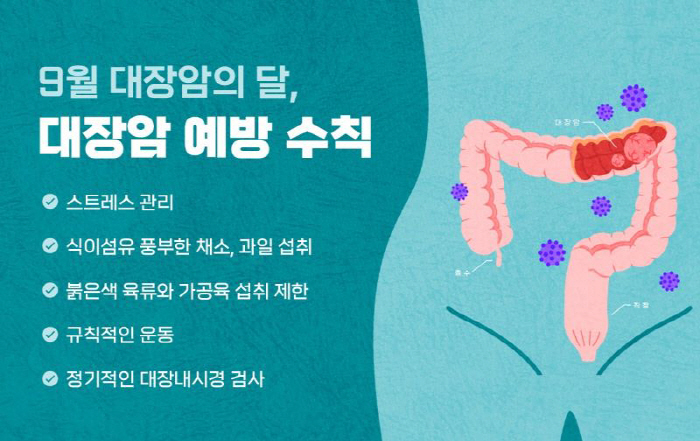Is Chronic Stress Causing Colorectal Cancer? Looking at the theory of camphor axis...
|
N2MT07||text parameter is needed (text ĒīīļØ╝ļ»ĖĒä░Ļ░Ć ĒĢäņÜöĒĢ®ļŗłļŗż.)
'When I'm stressed, I feel bloated', 'My stomach hurts lightly ahead of an important announcement' is a symptom that everyone must have experienced at least once.
The intestines that react sensitively according to emotions and tensions are deeply related to the stress of modern people. In the past, it was thought that psychological factors caused discomfort in the intestine, but recent studies scientifically explain this through the theory of the gut-brain axis, in which the brain and intestine constantly communicate through nerve, hormone, and immune pathways. Stress affects intestinal movement and intestinal microbial ecosystems, and can lead to chronic inflammatory bowel disease or colon health problems.
Son Hyo-moon, vice president of the Department of Gastroenterology at Himchan General Hospital in Incheon, explained, `The studied intestinal-brain axis theory explains the intercommunication system in which the brain and intestines interact with each other through nerve, hormone, and immune pathways\\\\\\\\\\\\\\\\\\\\\\\\\\\\\\\\\\\\\\.
ŌŚć Increase the risk of developing intestinal diseases that cause stress and inflammation
The intestine and brain are an organic system that seems to be independent organs, but is constantly communicating through the autonomic nervous system, endocrine system, and immune system. This is the heart of the intestinal-brain axis theory. The brain regulates emotions and stress and affects the motility and secretion function of the intestine, while the intestine affects brain function through neurotransmitters and metabolites produced by intestinal microbes.
In particular, stress directly affects intestinal function. When the brain perceives stress, it releases a stress hormone called cortisol. These hormones mainly perform essential functions for survival, such as raising blood sugar and promoting metabolism so that energy can be used quickly in stressful situations. However, if cortisol secretion is excessively increased due to chronic stress, the intestinal peristalsis is abnormally elevated or suppressed, causing abdominal pain, diarrhea, and constipation, and increasing the permeability of the intestinal mucosa to weaken the barrier.
As a result, harmful substances in the intestine enter the bloodstream, triggering a systemic inflammatory response.
In 2012, the Journal of the Korean Academy of Internal Medicine 'Stress-induced Digestive Physiological Changes: In relation to the occurrence of irritable bowel syndrome' According to the paper, cortisol levels were high in patients with irritable bowel syndrome, and hormonal imbalances and adverse reactions were observed. The researchers said that chronic stress induces continuous overreaction of autonomic nerves in the body, making functional gastrointestinal diseases more likely to occur, and aggravating symptoms of patients who already have diseases.
In addition, stress breaks down the balance of the gut microbiota. Stress hormones inhibit the growth of beneficial bacteria such as Bifidobacterium and Lactobacillus, while promoting the growth of some harmful bacteria. These changes weaken the intestinal mucosa and cause an inflammatory response at the site of the minor damage. Intestinal inflammation promotes DNA damage in intestinal epithelial cells, and over time increases the risk of progression to colon cancer through polyps.
ŌŚć Improving eating habits and managing stress are important
Therefore, in order to prevent various intestinal diseases including colon cancer, stress must be managed importantly in addition to diet and exercise. Mental stability is an essential factor in maintaining the balance of intestinal microorganisms and protecting the health of intestinal mucosa.
Stress is inevitable for modern people, but management is possible. Mindfulness activities such as meditation, deep breathing, and yoga are effective in controlling stress responses. Just sitting quietly for 10 minutes a day and breathing deeply can relax your nervous body and mind. It is also important to relieve stress through hobbies or social exchanges that you enjoy.
It is helpful to eat foods rich in probiotics and prebiotics for your usual intestinal health. Probiotics abundant in fermented foods such as yogurt, kimchi, and soybean paste increase the number of beneficial bacteria to improve the intestinal environment, and prebiotics in onions, garlic, bananas, and seaweed become good food for beneficial bacteria and help them multiply well.
You should remember to chew small portions of your meal. It is recommended to eat enough vegetables, fruits, and whole grains rich in dietary fiber to promote intestinal exercise. Avoid instant foods, spicy and salty irritating foods, and excessive meat consumption, as they can increase enteric harmful bacteria and cause inflammation of the intestinal mucosa. Sometimes, due to the obsession to get enough nutrition on stressful or tired days, they eat greasy pork belly and fried food even though they are bloated, but it is often better than meat or medicine to chew light meals such as soybean paste soup or kimchi soup in a small amount of rice.
Son Hyo-moon, vice president of the Department of Gastroenterology at Himchan General Hospital in Incheon, advised "Every September is Colon Cancer Month designated to inform the risk of colorectal cancer. In addition to managing your usual stress, practicing healthy eating habits, regular exercise, and regular colonoscopy is the best way to prevent colorectal cancer."
|
This article was translated by Naver AI translator.





